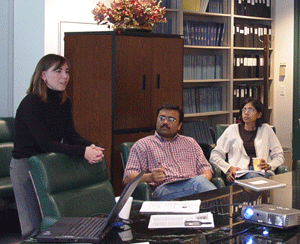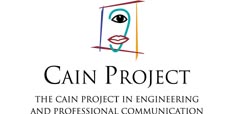
| IBB
Post-docs Ready for High Stakes Communication
|
|
Why Professional
Communication?
From time to time people ask why professional is in our name. As the
president has explained in the new vision statement, Rice educates
the whole person in its degree programs, linking experience inside
the classroom to events and contexts outside it. A student’s
future plans are part of the long-term context.
On campus, term papers, lab reports, lectures, discussions, and so
on characterize academic life. Off campus, communication practices
vary much more. A doctor-patient conference will be quite different
from a biochemist’s study or a bioengineer’s design proposal.
A team presentation or written report inside the classroom can never
be exactly the same as one delivered in industry, but situated practice
helps students reason analogously once they encounter audiences on
the job.
Communication assignments in first- and second-year courses
help students use language processes they already know to learn new
subjects. Later assignments can help students understand the voice
and role they will need in industry and not-for-profit organizations.
Workshops for graduate students help them choose the enhancements they
need individually.
Preparing students to lead through excellence in communication is our
mission. Helping graduate students and undergraduates develop the versatility
demanded by these different situations and audiences is why “professional” is
part of the Cain Project’s name.
|
Post-docs
and graduate students hone their analytical and research skills,
but to win a tenure-track faculty position, they must communicate
their experience and expertise to hiring committees. Rice graduate
students and post-docs who attended the “Interviewing for Faculty
Positions” workshop in February will be ready.
The Cain Project’s Tracy Volz and Mary Purugganan presented
this workshop on academic interviews and job talks as part of a
career development
series co-sponsored by the Institute for Biosciences and Bioengineering.
Workshop participants learned to
-
Analyze situation and audience
-
Organize their knowledge and experience
-
Convey confidence and professionalism
-
Give great job talks
-
Handle questions
According to Volz and Purugganan, candidates for faculty positions
should learn as much as possible about
their prospective employer, reflect on their own strengths,
and analyze
their past work experiences.
| Table of Contents |
IBB Post Docs
Ready
Writing a Paper for Publication
Using Technical Spanish
Engineers Without Borders
Redesigned CEVE Course
|
1
2
3
3
4 |
|
|
 |
Dr. Volz discusses interviewing and job talks with graduate
students in an IBB graduate student workshop.
|
|
To make
a good first impression, candidates should assemble a job portfolio
that includes evidence of their research productivity and professional
development. This portfolio should contain
- Curriculum Vita
- Research statement
- Teaching philosophy
- Papers and grants, especially if primary author
- Lab or technical skills
- Mentoring or supervising junior people in lab
- Service (to department, institution, community)
In science and engineering, the job talk is most often used to
assess a candidate’s
ability to teach, so it’s important to deliver a high quality talk. However,
candidates may also include sample syllabi, assignments, or teaching evaluations.
The final test comes “on your feet,” handling
questions. Workshop participants practiced strategies for
organizing answers during
an interview. |

|

![]()
